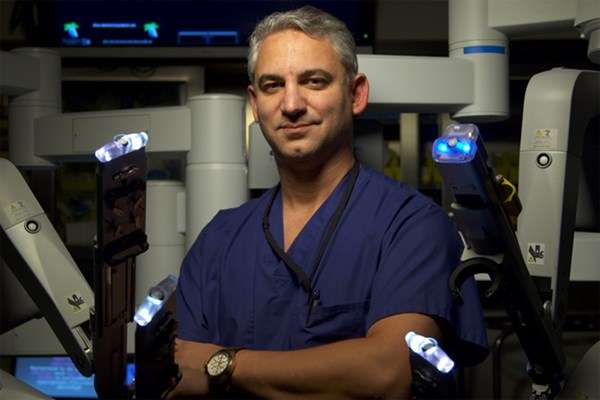New York, NY, Oct. 3, 2013 (GLOBE NEWSWIRE) -- In a major independent prostate cancer treatment study, minimally invasive prostate surgery proved significantly safer than open retropubic surgery. Both laparoscopic and robotic prostate removal surgery yielded fewer surgical complications and shorter hospital stays than their surgical predecessor.
http://www.globenewswire.com/newsroom/prs/?pkgid=17463
Robotic prostate surgery is the prevailing surgical treatment for prostate cancer in the United States. The procedure offers surgical enhancements in dexterity and visibility, but the steep learning curve requires a careful match of surgeon skill and robotic experience. David Samadi, MD, is Chairman of Urology, Chief of Robotic Surgery at Lenox Hill Hospital and one of only a few surgeons whose prostate cancer expertise spans open, laparoscopic, and robotic surgery.
"I've been involved in every phase of prostate removal surgery, from open and laparoscopic to robotic prostatectomy," said Dr. Samadi. "Today's robotic surgery patients reap the benefits of a more precise procedure with significantly reduced risk of complication."
Minimally invasive prostate removal best bet
In comparing laparoscopic and robotic prostate surgery with open surgery, researchers found the newer techniques mean:
- Fewer blood transfusions, down to 1.3 percent from 21 percent
- Complication rates cut by more than half, 5 percent verses 9 percent
- Shorter hospital stays by nearly a day and a half
Published in the July issue of the journal Urology, http://www.goldjournal.net/article/S0090-4295%2813%2900632-8/abstract, the comparative study looked at prostate cancer patient data from 2005 to 2010, including 30-day postop patient status. Of the cases reviewed, more than 4,000 men underwent laparoscopic or robotic prostate removal and close to 1,300 had their prostates removed with traditional surgery.
A separate study published this month in BJUI International, http://onlinelibrary.wiley.com/doi/10.1111/bju.12247/abstract, found robotic prostate surgery safer and more effective than laparoscopic surgery. Risk of major intra-operative harms during robotic surgery was under 0.5 percent, and the rate of surgical margins positive for cancer was 17.6 percent, 6 percent less than with laparoscopic surgery.
"The findings in each of these studies demonstrate how significant robotic surgery has revolutionized prostate cancer treatment," said Dr. Samadi.
Dr. Samadi's own Samadi Modified Advanced Robotic Technique (SMART) Surgery is based on decades of traditional and laparoscopic prostate removal experience. In addition to reducing surgical complications, SMART Surgery delivers superior postop quality of life; patients see faster results in both urinary control and sexual potency.
"Nearly all of my patients are in surgery for less than two hours. That's two-and-a-half hours less than the average robotic prostate removal surgery, greatly reducing the window of risk," Dr. Samadi added.
Dr. Samadi's robotic prostate surgery is available to men from around the world at the Lenox Hill Hospital Prostate Cancer Center in New York City.
A photo accompanying this release is available at:
http://www.globenewswire.com/newsroom/prs/?pkgid=21370
